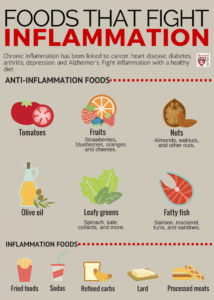If you have a condition that causes inflammation, it may help to change your eating habits.
What to Eat
In a nutshell, anti-inflammatory foods are those that any mainstream nutrition expert would encourage you to eat. Inflammation of the digestive system is a problem that many people suffer from and it is caused in the most part by food intolerances. Luckily there are herbal remedies from places like purple lotus dispensary which can help to ease your discomfort, but you will also need to pay close attention to which foods tend to trigger your symptoms. Sticking to anti-inflammatory foods is a great way to take back control. They include lots of fruits and vegetables, whole grains, plant-based proteins (like beans and nuts), fatty fish, and fresh herbs and spices.
 Fruits and veggies: Go for variety and lots of color. Research has shown that vitamin K-rich leafy greens like spinach and kale curb inflammation, as does broccoli and cabbage. And the substance that gives fruits like raspberries and blackberries their color is a type of pigment that also helps fight inflammation.
Fruits and veggies: Go for variety and lots of color. Research has shown that vitamin K-rich leafy greens like spinach and kale curb inflammation, as does broccoli and cabbage. And the substance that gives fruits like raspberries and blackberries their color is a type of pigment that also helps fight inflammation.- Whole grains: Oatmeal, brown rice, whole-wheat bread, and other unrefined grains tend to be high in fiber, and fiber also may help with inflammation.
- Beans: They’re high in fiber, plus they’re loaded with antioxidants and other anti-inflammatory substances.
- Nuts: They have a healthy kind of fat that helps stop inflammation. (Olive oil and avocados are also good sources.) Stick to just a handful of nuts a day.
- Fish: Put it on your plate at least twice a week. Salmon, tuna, and sardines all have plenty of omega-3 fatty acids, which fight inflammation.
- Herbs and spices: They add antioxidants (along with flavor) to your food. Turmeric, found in curry powder, has a strong substance called curcumin. And garlic curbs the body’s ability to make things that boost inflammation.
What Not to Eat
Anything highly processed, overly greasy, or super sweet isn’t a good choice for you if you have inflammation. This includes the following:
- Refined starches and sugary foods: They’re not dense in nutrients, and they’re easy to overeat, which can lead to weight gain, high blood sugar, and high cholesterol (all related to inflammation). Sugar causes the body to release inflammatory messengers called cytokines. Soda and other sweet drinks are main culprits.
- High-fat and processed red meat (like hot dogs): These have a lot of saturated fat, which can cause inflammation if you get more than a small amount each day.
- Butter, whole milk, and cheese: Again, the problem is saturated fat. Instead, eat low-fat dairy products. They’re not considered inflammatory.
- French fries, fried chicken, and other fried foods: Cooking them in vegetable oil doesn’t make them healthy. Corn, safflower, and other vegetable oils all have omega-6 fatty acids. You need some omega-6s, but if you get too much you throw off the balance between omega-6s and omega-3s in your body and end up with more inflammation.
- Coffee creamers, margarine, and anything else with trans fats: Trans fats (look on the label for “partially hydrogenated oils”) raise LDL cholesterol, which causes inflammation. There’s no safe amount to eat, so steer clear.
- Wheat, rye, and barley: The focus here is gluten, and this one’s a controversial maybe. People who have celiac disease need to avoid gluten. But for everyone else, the science is solid that whole grains are beneficial.
Try to adopt an anti-inflammation diet for a minimum of 3 weeks to see how it impacts your symptoms. For ideas to further change the diet, you can try looking at a keto calculators list and other online resources for ideas. Either way, some people experience relief in just a week to ten day so be sure to stick with it and consult your doctor when starting any type of diet or nutritional program.
*Article adapted from WebMD article on inflammation. For full article, visit https://www.webmd.com/diet/anti-inflammatory-diet-road-to-good-health

